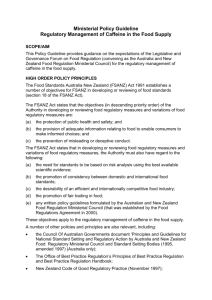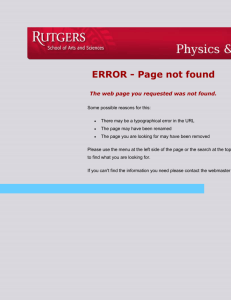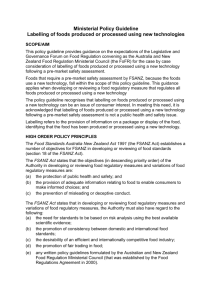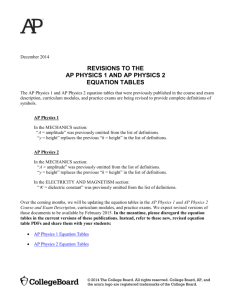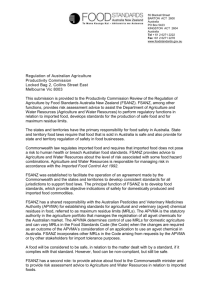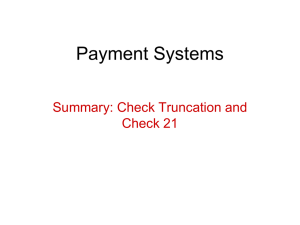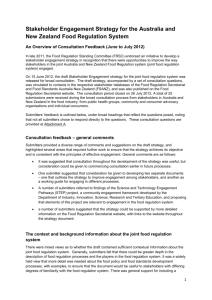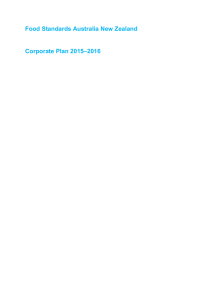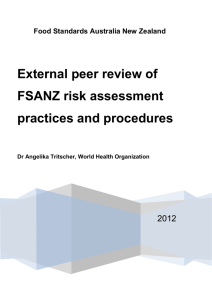P1040-AppR - Food Standards Australia New Zealand
advertisement
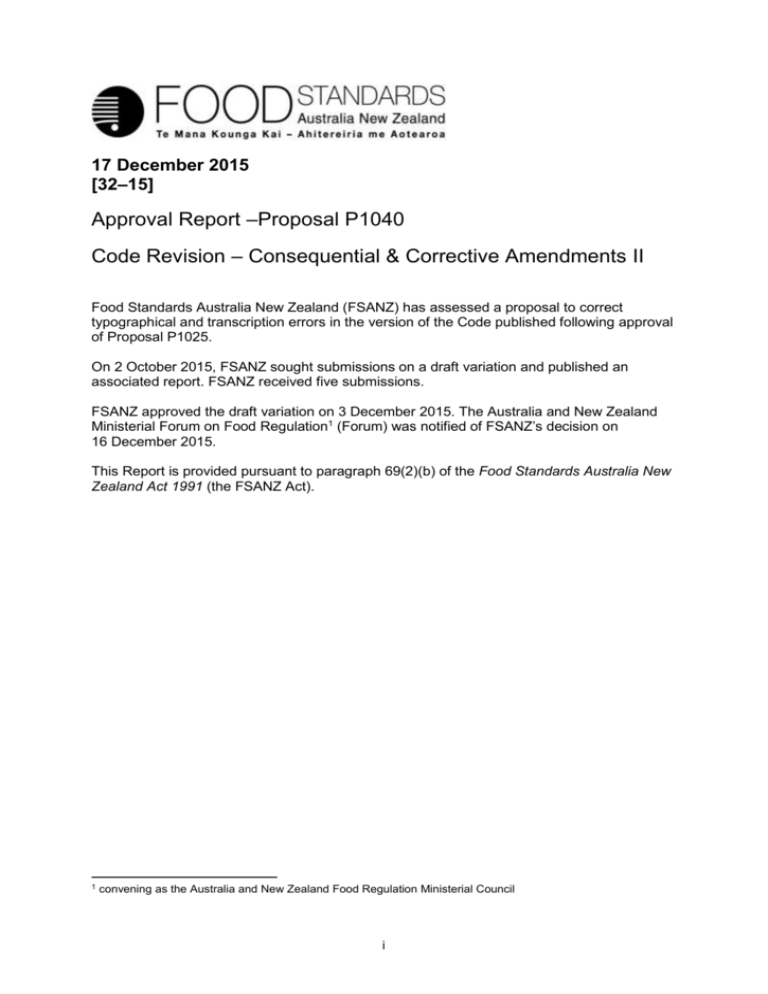
17 December 2015 [32–15] Approval Report –Proposal P1040 Code Revision – Consequential & Corrective Amendments II Food Standards Australia New Zealand (FSANZ) has assessed a proposal to correct typographical and transcription errors in the version of the Code published following approval of Proposal P1025. On 2 October 2015, FSANZ sought submissions on a draft variation and published an associated report. FSANZ received five submissions. FSANZ approved the draft variation on 3 December 2015. The Australia and New Zealand Ministerial Forum on Food Regulation1 (Forum) was notified of FSANZ’s decision on 16 December 2015. This Report is provided pursuant to paragraph 69(2)(b) of the Food Standards Australia New Zealand Act 1991 (the FSANZ Act). 1 convening as the Australia and New Zealand Food Regulation Ministerial Council i Table of Contents EXECUTIVE SUMMARY.........................................................................................................................2 1 INTRODUCTION .............................................................................................................................3 1.1 1.2 1.3 1.4 2 THE CURRENT STANDARD ..........................................................................................................3 REASONS FOR PREPARING THE PROPOSAL..................................................................................3 PROCEDURE FOR ASSESSMENT ..................................................................................................3 DECISION ..................................................................................................................................3 SUMMARY OF THE FINDINGS......................................................................................................3 2.1 SUMMARY OF ISSUES FOLLOWING THE CALL FOR SUBMISSIONS.....................................................3 2.2 RISK ASSESSMENT .....................................................................................................................5 2.3 RISK MANAGEMENT ....................................................................................................................5 2.4 RISK COMMUNICATION................................................................................................................5 2.4.1 Consultation .........................................................................................................................5 2.5 FSANZ ACT ASSESSMENT REQUIREMENTS .................................................................................6 2.5.1 Section 59 ............................................................................................................................6 2.5.2. Subsection 18(1)..............................................................................................................6 ATTACHMENT A – APPROVED DRAFT VARIATION TO THE REVISED AUSTRALIA NEW ZEALAND FOOD STANDARDS CODE (COMMENCING 1 MARCH 2016) .................................................................................8 ATTACHMENT B – EXPLANATORY STATEMENT .......................................................................................14 1 Executive summary The Board has approved a revision of the Australia New Zealand Food Standards Code (the revised Code). The revised Code will replace the current Australia New Zealand Food Standards Code (the current Code) on 1 March 2016, when the current Code will be repealed. This Proposal makes minor variations to the revised Code in order to correct minor errors. The approved draft variation differs slightly to the version that was the subject of the call for submissions. Six minor changes were made following the call for submissions. These changes are explained in this report. 2 1 Introduction 1.1 The current Standard The approved draft variation amends various standards in the revised Code which takes effect on 1 March 2016. 1.2 Reasons for preparing the Proposal The Board approved the revised Code, which will replace the current Code on 1 March 2016, when the current Code will be repealed. The revised Code contains minor typographical and transcription errors. The purpose of Proposal P1040 is to amend the revised Code to correct these errors to ensure that the revised Code is consistent with the current Code when the revised Code commences on 1 March 2016. 1.3 Procedure for assessment The Proposal was assessed under the minor procedure. 1.4 Decision The draft variation, as proposed following assessment, was approved with six minor amendments. These six amendments are explained in section 2.1 below. The variation will commence on 1 March 2016, with the exception of items 1 and 4 of the Schedule. These two items will commence on 19 January 2017. The approved draft variation, as varied after consideration of submissions, is at Attachment A. The related explanatory statement is at Attachment B. An explanatory statement is required to accompany an instrument if it is lodged on the Federal Register of Legislative Instruments. 2 Summary of the findings 2.1 Summary of issues following the call for submissions FSANZ received five responses to the call for submissions. None opposed the proposed draft variation. Three submissions raised issues that related to the drafting of the food regulatory measure. These issues are summarised below. Three additional errors in the revised Code were also identified after the call for submissions was released. These errors, and FSANZ’s response to each, is explained in the last three entries in the Table below. 3 Table 1: Summary of issues Issue Raised by FSANZ response (including any amendments to drafting) Subclause 3(2) of the consultation draft variation. The subclause states that Item 1 and 4 of the Schedule commence on 19 January 2017. For added clarity, the subclause should use the phrase take effect instead of commence. MPI No change made. Item 4 of the Schedule of the consultation draft variation. Item 4 will remove the Note to section 1.2.7—12 from the Code on 19 January 2107. The proposed amendment is difficult to comprehend. The Note should be retained and amended to explain clearly that that Note will be removed on 19 January 2016. FTAA The text of the sub-clause reflects the language and requirements of the legislation under which the draft variation is being made. The text used is also consistent with FSANZ and Commonwealth drafting practice. Its intent and effect is also clear. No change made. The amendment removes a Note that draws attention to the operation of a standard that will cease to have effect on 18 January 2017. At that point, that Note will be redundant. The amendment will commence, and remove the Note, on 19 January 2017. FSANZ is satisfied that the intent and effect of the proposed amendment is clear. FSANZ is also satisfied the current text of the Note is appropriate. Item 7 of the Schedule of the consultation draft variation. The Item refers to incorrect sections. Item 8 of the Schedule of the consultation draft variation. Item 8 reformats the words edible oil spread in the Note to section 2.4.2—2. Item 8 does not reflect how those words appear in the version of the Code published online by Comlaw. That version contains another typographical error. The word spread is not bolded and not italicised. MPI Item 7 contained a transcription error, which has now been corrected. MPI Item 8 has been amended to reflect and correct the publication error. Item 15 of the Schedule of the consultation draft variation. A consequential amendment is required to the table to section S1—2 as a result of the Item’s proposed omission of Note 4 to that table. Qld Health Item 15 has been amended to include the consequential amendment. The superscripts in the table to section S1—2 have been amended to reflect the omission of Note 4 to that table. Superscript 3 has been reassigned to Columns 3, 4 and 5 for the entry in that table for Vitamin E. See new Items 15 and 15A in Schedule 1. 4 Issue Raised by FSANZ response (including any amendments to drafting) Paragraph (2)(b) of the Note to section 1.3.1—2 contains a typographical error. The word that is repeated twice. Section S3—27 contains a transcription error. It refers to cfu/kg instead of cfu/g. Section S29—17 contains a typographical error. The heading to the table in that section contains the words ‘and intake amounts’. The table does not show intake amounts. MPI The error has been corrected. See Item 4A of the Schedule. FSANZ The error has been corrected. See Item 16A of the Schedule FTAA The error has been corrected. See Item 24 of the Schedule. 2.2 Risk assessment The revised Code contains a number of minor errors which must be corrected prior to 1 March 2016. The revised Code would be inconsistent with the current Code if a draft variation had not been approved. That is, the revised Code would not reflect existing law. This may result in regulatory uncertainty and consequential increased costs to government, industry and consumers 2.3 Risk management Amendment of the revised Code to correct the errors is the only risk management option available. 2.4 Risk communication 2.4.1 Consultation Consultation is a key part of FSANZ’s standards development process. However, as P1040 was assessed under the minor procedure, it did not require public consultation. Government agencies were consulted on the draft variation. However, in line with a commitment given to the Senate in 2007, submissions were also called for from affected stakeholders. A copy of the call for submissions was also published online. Five submissions were received. FSANZ acknowledges the time taken by individuals and organisations to make submissions on this Proposal. All comments are valued and contribute to the rigour of our assessment. 5 2.5 FSANZ Act assessment requirements When assessing this Proposal and the subsequent development of a food regulatory measure, FSANZ has had regard to the following matters in section 59 of the FSANZ Act: 2.5.1 Section 59 2.5.1.1 Cost benefit analysis Section 59 requires FSANZ to have regard to whether the direct and indirect benefits that would arise from a food regulatory measure developed as a result of this Proposal will outweigh the costs to the community, Government or industry that would arise from the development of that measure. Proposal P1040 will not impose any new requirements. Its purpose is to correct typographical and other similar errors in the P1025 Code. None of the proposed amendments will impose any obligations on or vary the rights of any person. As such, the draft variation is not expected to impose costs on the community, industry or Government that are additional to those already generated by compliance with or enforcement of the current Code. Not proceeding with P1040 and the draft variation may result in regulatory uncertainty and increased compliance costs to industry. This is because, without the draft variation, the revised Code will remain inconsistent with the current Code and not reflect existing law. For this reason, one can reasonably conclude that the benefits to the community, Government or industry that will arise from the draft variation will outweigh the costs that would arise from the development of that measure. 2.5.1.2 Other measures For the reasons explained above, there are no other measures (whether available to FSANZ or not) that would be more cost-effective than a food regulatory measure developed or varied as a result of the Proposal. 2.5.1.3 Any relevant New Zealand standards Most standards affected by this Proposal are joint Australia – New Zealand standards. 2.5.1.4 Any other relevant matters Other relevant matters are considered below. 2.5.2. Subsection 18(1) FSANZ has also considered the three objectives in subsection 18(1) of the FSANZ Act during the assessment. 2.5.2.1 Protection of public health and safety The purpose of P1040 is to correct minor typographical and transcription errors in the revised Code. The correction of these errors does not make any substantive change to the revised Code and, consequently, the draft variation itself does not raise any public health and safety issues for consideration. However, by correcting errors and avoiding regulatory uncertainty, the draft variation facilitates this statutory objective. 6 2.5.2.2 The provision of adequate information relating to food to enable consumers to make informed choices By avoiding regulatory uncertainty and in ensuring that the P1025 Code will reflect the current Code, the draft variation will enhance the provision of information and the ability of consumers to make informed choices. 2.5.2.3 The prevention of misleading or deceptive conduct No issues regarding the prevention of misleading and deceptive conduct have been identified in relation to P1040. 2.5.3 Subsection 18(2) considerations FSANZ has also had regard to: the need for standards to be based on risk analysis using the best available scientific evidence The purpose of P1040 is to correct minor errors in the revised Code and to ensure that it reflects the current Code. The measures contained in the current Code and the revised Code were based on risk assessments that used the best available scientific evidence. the promotion of consistency between domestic and international food standards The purpose of P1040 is to correct minor errors to ensure the revised Code reflects the current Code. That is, the intent is not changed. Therefore, this consideration is not relevant. the desirability of an efficient and internationally competitive food industry By avoiding regulatory uncertainty, the draft variation will contribute towards supporting an efficient and internationally competitive food industry. the promotion of fair trading in food Again, by avoiding regulatory uncertainty, the draft variation would assist in promoting fair trading in food. any written policy guidelines formulated by the Ministerial Council2 No relevant guidelines issued by the Ministerial Council specifically apply to Proposal 1040. Attachments A. B. Approved draft variation to the revised Australia New Zealand Food Standards Code (commencing 1 March 2016) Explanatory Statement 2 Now known as the Australia and New Zealand Ministerial Forum on Food Regulation (convening as the Australia and New Zealand Food Regulation Ministerial Council) 7 Attachment A – Approved draft variation to the revised Australia New Zealand Food Standards Code (commencing 1 March 2016) Food Standards (Proposal P1040 – Code Revision – Consequential & Corrective Amendments II) Variation The Board of Food Standards Australia New Zealand gives notice of the making of this variation under section 92 of the Food Standards Australia New Zealand Act 1991. The variation commences on the dates specified in clause 3 of this variation. Dated [To be completed by Standards Management Officer] Standards Management Officer Delegate of the Board of Food Standards Australia New Zealand Note: This variation will be published in the Commonwealth of Australia Gazette No. FSC XX on XX Month 20XX. This means that this date is the gazettal date for the purposes of clause 3 of the variation. 8 1 Name This instrument is the Food Standards (Proposal P1040 – Code Revision – Consequential & Corrective Amendments II) Variation. 2 Variation to standards in the Australia New Zealand Food Standards Code The Schedule varies standards in the Australia New Zealand Food Standards Code. 3 Commencement (1) Subject to subsection (2), the variation commences on 1 March 2016 immediately after the commencement of Standard 5.1.1 – Revocation and transitional provisions – 2014 Revision. (2) Items 1 and 4 of the Schedule commence on 19 January 2017. Schedule Standard 1.1.1—Structure of the Code and general provisions [1] Subsection 1.1.1—2(2) Omit ‘Standard 1.2.12 – Transitional standard for dietary fibre nutrition content claims’ Standard 1.1.2—Definitions used throughout the Code [2] Subsection 1.1.2—2(3) (definition of individual portion pack) Omit ‘1.2.1—6(4)’, substitute ‘1.2.1—6(3)’ [3] Section 1.1.2—12 (Note) Omit ‘S28—2, 0, S29—18’, substitute ‘S28—2, S29—18’ Standard 1.2.7 – Nutrition, health and related claims [4] Section 1.2.7—12 (Note) Omit the Note Standard 1.3.1 – Food additives [4A] Section 1.3.1—2 (Note) Omit ‘that that’, substitute ‘that’ Standard 1.4.1 – Contaminants and natural toxicants [5] Subsection 1.4.1—3(3) Omit substitute Standard 1.4.2 – Agvet chemicals [6] Standard Heading (Note 3) Omit ‘2014’, substitute ‘2014.’ Standard 1.5.2 – Food produced using gene technology [7] Standard Heading (Note 3) Omit ‘1.1.1—10(3)(c) and (4)(g)’, substitute ‘1.1.1—10(5)(c) and (6)(g)’ 9 Standard 2.4.2 – Edible oil spreads [8] Section 2.4.2—2 (Note) Omit ‘edible oil spread’, substitute ‘edible oil spread’ Standard 2.7.1—Labelling of alcoholic beverages and food containing alcohol [9] Section 2.7.1—1 Omit ‘Alcoholic beverages’, substitute ‘Labelling of alcoholic beverages and food containing alcohol’ Standard 2.7.4—Wine and wine product [10] Standard Heading (Note 3) Omit ‘the Wine Australia Corporation Act 1980 (Cth)’, substitute ‘the Australian Grape and Wine Authority Act 2013 (Cth)’ Standard 2.9.4 – Formulated supplementary sports foods [11] Paragraph 2.9.4—6(2)(a) Omit ‘of reconstitution’, substitute ‘or reconstitution’ Standard 2.9.5 – Food for special medical purposes [12] Paragraph 2.9.5—3(b) Omit ‘Part 2’, substitute ‘Part 1.2’ Standard 2.9.6 – Transitional standard for special purpose foods (including amino acid modified foods) [13] Section 2.9.6—3 (Note) Omit ‘published’, substitute ‘published.’ Standard 2.10.2 – Salt and salt products [14] Section 2.10.2—3 Omit all text after the words ‘A food’, substitute ‘that is sold as ‘salt’ must be salt and contain no less than 970 g/kg sodium chloride on a dry basis, exclusive of permitted additives.’ Schedule 1 – RDIs and ESADDIs [15] Section S1—2 (table) Omit Vitamin E RDI 10 mg alphatocopherol equivalents4 5 mg alphatocopherol equivalents4 4 mg alphatocopherol equivalents4 RDI 10 mg alphatocopherol equivalents3 5 mg alphatocopherol equivalents3 4 mg alphatocopherol equivalents3 substitute Vitamin E [15A] Section S1—2 (Notes) Omit Note 1 See paragraph 1.1.2—14(a). Note 2 See paragraph 1.1.2—14(b). Note 3 See paragraph 1.1.2—14(c). Note 4 See paragraph 1.1.2—14(d). substitute Note 1 See paragraph 1.1.2—14(3)(a). 10 Note 2 See paragraph 1.1.2—14(3)(b). Note 3 See paragraph 1.1.2—14(3)(c). Schedule 2 – Units of measurement [16] Section S2—2 (table) Omit ‘mJ’, substitute ‘MJ’ Schedule 3 – Identity and Purity [16A] Section S3—27 Omit ‘cfu/kg’, substitute ‘cfu/g’ Schedule 4 – Nutrition, health and related claims [17] Section S4—2 (Note - definition of sugars) Omit ‘(a)’ (second occurring), substitute ‘(b)’ [18] Section S4—5 (table) (a) Omit Iodine Contributes to normal growth and development Children substitute Contributes to normal growth and development Children (b) Omit Selenium Contributes to the maintenance of normal hair and nails substitute Contributes to the maintenance of normal hair and nails (c) Omit Energy Contributes to weight loss or weight maintenance Diet reduced in energy and including regular exercise substitute 11 The food: (a) meets the conditions for making a ‘diet’ nutrition content claim; or (b) is a formulated meal replacement and contains no more than 1200 kJ per serving Contributes to weight loss or weight maintenance Diet reduced in energy and including regular exercise The food: (a) meets the conditions for making a ‘diet’ nutrition content claim; or (b) is a formulated meal replacement and contains no more than 1200 kJ per serving Schedule 12 – Nutrition information panels [19] Section S12—4 (table) Omit ‘Your daily intakes may be higher or lower depending on your energy needs.’ Schedule 15 – Substances that may be used as food additives [20] Section S15—5 (table) (a) Omit the following from item 1.4.2 (where second occurring) 234 475 Nisin Polyglycerol esters of fatty acids 10 5 000 Only whipped thickened light cream (b) Insert in item 2.2.2 in numerical order 200 201 202 203 Sorbic acid and sodium, potassium and calcium sorbates 2 000 Schedule 18 – Processing aids [21] Section S18—3 (table) Omit Diethylenetriamine, triethylene-tetramine, or tetraethylenepentamin cross-linked with epichlorohydrin GMP substitute Diethylenetriamine, triethylene-tetramine, or tetraethylenepentamine cross-linked with epichlorohydrin GMP Schedule 26 – Food produced using gene technology [22] Schedule Heading (Note 1) Omit ‘1.1.1—10(3)(c) and (4)(g)’, substitute ‘1.1.1—10(5)(c) and (6)(g)’ [23] Subsection S26—3(4) (table) (a) Omit 4 Lucerne (a) herbicide-tolerant lucerne lines J101 & J163 substitute 4 Lucerne (a) herbicide-tolerant lucerne lines J101 and J163 (b) Omit (b) food derived from reduced lignin lucerne line KK179 substitute 12 (b) reduced lignin lucerne line KK179 Schedule 29 – Special purpose foods [24] Section S29—17 (Table heading) Omit ‘and intake amounts’ [24A] Section S29—21 (Notes) Omit Note 1 See paragraph 1.1.2—14(3)(a) Note 2 For niacin, add niacin and any niacin provided from the conversion of the amino acid tryptophan, using the conversion factor 1:60. Note 3 See paragraph 1.1.2—14(3)(d) substitute Note 1 See paragraph 1.1.2—14(3)(a). Note 2 For niacin, add niacin and any niacin provided from the conversion of the amino acid tryptophan, using the conversion factor 1:60. Note 3 See paragraph 1.1.2—14(3)(c). 13 Attachment B – Explanatory Statement 1. Authority Section 13 of the Food Standards Australia New Zealand Act 1991 (the FSANZ Act) provides that the functions of Food Standards Australia New Zealand (the Authority) include the development of standards and variations of standards for inclusion in the Australia New Zealand Food Standards Code (the current Code). Division 2 of Part 3 of the FSANZ Act specifies that the Authority may prepare a proposal for the development or variation of food regulatory measures, including standards. This Division also stipulates the procedure for considering a proposal for the development or variation of food regulatory measures. FSANZ has published a revision of the current Code in April 2015 (the revised Code). The revised Code will replace the current Code on 1 March 2016, when the current Code will be repealed. FSANZ prepared Proposal P1040 to correct minor errors in the published revised Code. The Authority has considered the Proposal in accordance with Division 2 of Part 3 and has approved a draft variation. Following consideration by the Australia and New Zealand Ministerial Forum on Food Regulation3, section 92 of the FSANZ Act stipulates that the Authority must publish a notice about the standard or draft variation of a standard. Section 94 of the FSANZ Act specifies that a standard, or a variation of a standard, in relation to which a notice is published under section 92 is a legislative instrument, but is not subject to parliamentary disallowance or sunsetting under the Legislative Instruments Act 2003. 2. Purpose The Authority has approved the draft variation to correct minor typographical and transcription errors. 3. Documents incorporated by reference The variation to the revised Code does not incorporate any documents by reference not already incorporated into the current Code. 4. Consultation In accordance with the procedure in Division 2 of Part 3 of the FSANZ Act, the Authority’s consideration of P1040 included one round of consultation with appropriate government agencies following an assessment and the preparation of a draft variation and associated report. The call for submissions was also notified in FSANZ’s Notification Circular to ensure all stakeholders were informed and had an opportunity to make a submission. A Regulation Impact Statement was not required because the proposed variation to the revised Code is likely to have a minor regulatory impact on business and individuals. 3 convening as the Australia and New Zealand Food Regulation Ministerial Council 14 5. Statement of compatibility with human rights This instrument is exempt from the requirements for a statement of compatibility with human rights as it is a non-disallowable instrument under section 94 of the FSANZ Act. 6. Variation Section 1.1.1—2 Item [1] deletes the reference to Standard 1.2.12 – Transitional standard for dietary fibre nutrition content claims. That Standard will cease to have effect on 18 January 2017. Item [1] will take effect and remove the reference on 19 January 2017. Section 1.1.2—2(3) (definition of individual portion pack) Item [2] replaces ‘1.2.1—6(4)’ with ‘1.2.1—6(3)’, to correct a referencing error. Section 1.1.2—2 (Note) Item [3] deletes ‘0’ to correct a transcription error. Section 1.2.7—12 (Note) Item [4] deletes the Note as it refers to to Standard 1.2.12 – Transitional standard for dietary fibre nutrition content claims. That Standard will cease to have effect on 18 January 2017. Item [4] will take effect and remove the reference on 19 January 2017. Section 1.3.1—2 (Note) Item [4A] replaces the words ‘that that’ with ‘that’ to correct a typographical error. Section 1.4.1—3(3) Item [5] replaces the formula to correct a typographical error. Section 1.4.2 Standard Heading (Note 3) Item [6] replaces ‘2014’ with ‘2014.’, to correct a typographical error. Section 1.5.2 Standard Heading (Note 3) Item [7] replaces ‘1.1.1—10(3)(c) and (4)(g)’ with ‘1.1.1—10(5)(c) and (6)(g)’, to correct a referencing error. Section 2.4.2—2 (Note) Item [8] replaces ‘edible oil spread’ with ‘edible oil spread’, to correct a typographical error’. Section 2.7.1—1 Item [9] replaces ‘Alcoholic beverages’ with ‘Labelling of alcoholic beverages and food containing alcohol’, to correct a transcription error. 15 Standard 2.7.4 Standard Heading (Note 3) Item [10] replaces ‘the Wine Australia Corporation Act 1980 (Cth)’ with ‘the Australian Grape and Wine Authority Act 2013 (Cth)’, as the former Act has been repealed and replaced by the latter. Section 2.9.4—6(2)(a) Item [11] replaces ‘of reconstitution’ with ‘or reconstitution’, to correct a typographical error. Section 2.9.5—3(b) Item [12] replaces ‘Part 2’ with ‘Part 1.2’, to correct a typographical error. Section 2.9.6—3 (Note) Item [13] replaces ‘published’ with ‘published.’, to correct a typographical error. Section 2.10.2—3 Item [14] amends the text of the section so that it reads ‘A food that is sold as ‘salt’ must be salt and contain no less than 970 g/kg sodium chloride on a dry basis, exclusive of permitted additives.’ This is to correct a typographical error. Schedule 1 Section S1—2 (Table) Item [15] amends the entry for Vitamin E in the table to section S1—2. It replaces each reference in that entry to Note 4 to a reference to Note 3. This consequential amendment is required by the amendments made by item [15B] of this Schedule. Section S1—2 (Notes) Item [15A] omits the Notes and replaces them with the following, to correct a referencing error: Note 1 Note 2 Note 3 See paragraph 1.1.2—14(3)(a). See paragraph 1.1.2—14(3)(b). See paragraph 1.1.2—14(3)(c). Schedule 2 Section S2—2 (table) Item [16] replaces ‘mJ’ with ‘MJ’, to correct a typographical error. Schedule 3 Section S3—27 Item [16A] replaces ‘cfu/kg’ with ‘cfu/g’, to correct a transcription error. 16 Schedule 4 Section S4—2 (definition of sugars) Item [17] replaces ‘(a)’ (second occurrence) with ‘(b)’, to correct a numbering error. Section S4—5 (table) (a) Item [18] corrects a typographical error by removing the duplicate reference in column 1 of the table to ‘Iodine’ (second occurrence). (b) Item [18] corrects a typographical error by removing the duplicate reference in column 1 of the table to ‘Selenium’ (second occurrence) and by correcting the formatting of the row for that entry. (c) Item [18] corrects a typographical error by removing the duplicate reference in column 1 of the table to ‘Energy’ (second occurrence) and by correcting the formatting of the row for that entry. Schedule 12 Section S12—4 (table) Item [19] deletes the following unnecessary sentence from the table: ‘Your daily intakes may be higher or lower depending on your energy needs.’ Schedule 15 Section S15—5 (table) (a) Item [20] removes the duplicate entries in item 1.4.2 of the table for ‘Nisin’ (second occurrence) and ‘Polyglycerol esters of fatty acids’ (second occurrence), to correct a typographical error. (b) Item [20] inserts the following into the item 2.2.2 of the table, in numerical order, to correct a transcription error. 200 201 202 203 Sorbic acid and sodium, potassium and calcium sorbates 2 000 Schedule 18 Section S18—3 (table) Item [21] replaces ‘tetraethylenepentamin’ with ‘tetraethylenepentamine’, to correct a typographical error. Schedule 26 Schedule Heading (Note 1) Item [22] replaces ‘1.1.1—10(3)(c) and (4)(g)’ with ‘1.1.1—10(5)(c) and (6)(g)’, to correct a referencing error. 17 Section S26—3(4) (table) (a) Item [23] replaces ‘&’ with ‘and’ in entry 4(a), to correct a typographical error. (b) Item [23] deletes ‘food derived from’ in entry 4(b), to correct a typographical error. Schedule 29 Section S29—17 (Table heading) Item [24] omits the words ‘and intake amounts’ from the heading to the table in section S29— 17. No intake amounts are shown in the table. Section S29—21 (Notes) Item [24A] replaces the Notes with new Notes to correct typographical errors. That is, by inserting a full stop at the end of Note 1; replacing ‘1.1.2—14(3)(d)’ with ‘1.1.2—14(3)(c)’ in Note 3; and inserting a full stop at the end of Note 3. 18
